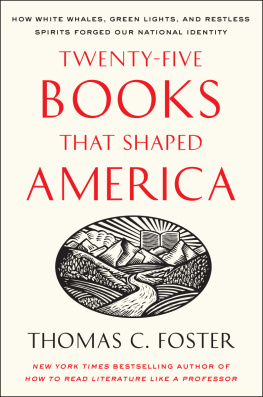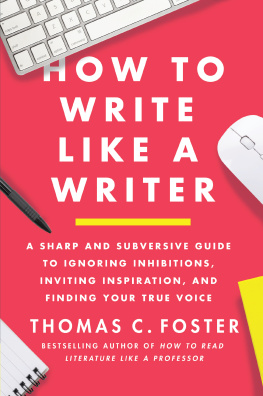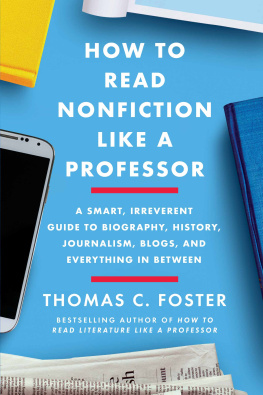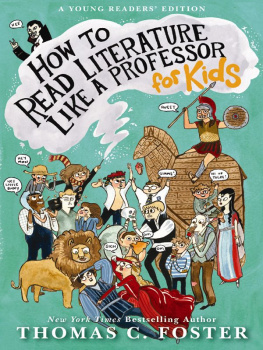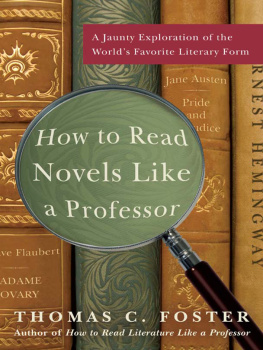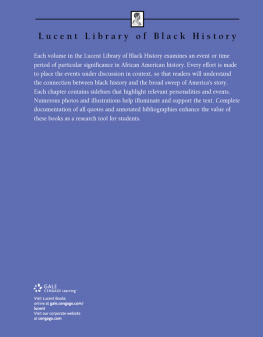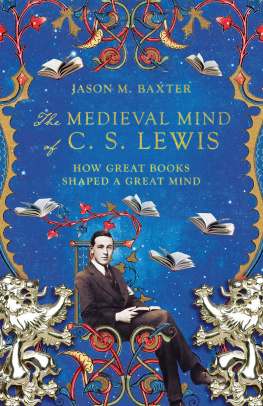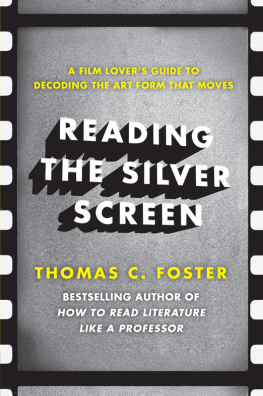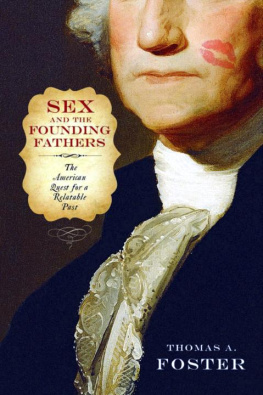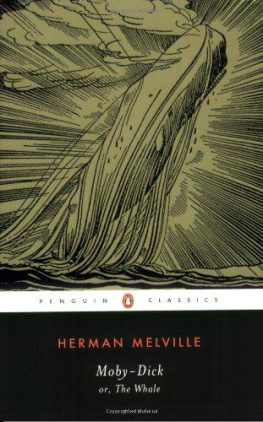Thomas C. Foster
Introduction
In the Four Corners
O kay, heres what was actually written: In the four corners of the globe, who reads an American book? The question came in an essay in the Edinburgh Review in 1820 from the writer and clergyman Sydney Smith. Theres more, of course, in the same vein, or goes to an American play? or sees an American picture or statue? But our concern here is books, so well pull the focus tight.
Talk about sore losers! How snotty. How British. Clearly Sydney Smith was deeply stung by a couple of ringing losses to the former colonists, one in the American Revolution and the other in the War of 1812. He probably would have smarted still more had he lived to hear Jimmy Driftwoods paean to Andrew Jackson, The Battle of New Orleans. Still, he was sufficiently annoyed to take refuge in literature, where the upstarts across the pond were in fact only beginning to write books. Virtually everything we think of as American literature still lay in the future. There was a smattering of poems and narratives, mostly personal or historical, dating back to the earliest years of colonization, but little to compare to William Wordsworth or Thomas Gray or Samuel Coleridge in verse or to Henry Fielding or Laurence Sterne in fiction.
Smiths larger point was that America had, in the thirty or so years of independence, added nothing to the sum of human understanding or, more particularly, English culture. To a great extent, he was right. He was certainly right that no civilized country was built on a system where every sixth man is a slave, but thats an argument for a bit later. And he was substantially correct that very little was being produced in the way of arts and culture, although perhaps mistaken in suggesting that such a shortcoming meant we had squandered all the advantages we had been given by being subjects, and by no means the most valued subjects of His Majesty, King George. His point obtains: by 1820, books, plays, and paintings, to say nothing of musical compositions, scientific discoveries, and works of moral philosophy, were not exactly thick on Yankee ground. To which, one must counter with a mature and reasoned response.
So what?
Hey, we had more pressing issues to attend to, such as not starving to death, clearing forests, subduing natives, carving a republic out of bits of contemporary philosophy and very mixed feelings about human nature, building cities and villages out of thin air, embracing the concept of liberty while enslaving fellow humans.
Not all pressing issues, clearly, are created equal.
Creating literature is a leisure activity, rarely undertaken by those for whom food and shelter are at issue. What Americans lacked in the period 17831819 in leisure, however, they made up for in energy, enthusiasm, rudimentary learning, and vivid experience. How many miles of road, for instance, was England required to build during those decades? What the snobbish Smith couldnt know was that this populace he denigrated was on the verge of cutting loose.
Besides, what he probably couldnt recognize, despite his training in moral philosophy and theology, was that America had already contributed the two most important documents of political philosophy in the history of the world. All of the writers and thinkers Smith adduces in support of his claim of Americas insufficiency, combined, changed the world less than the Declaration of Independence and the Constitution. We have sometimes had trouble living up to our two holy documents, and heaven knows, its still a struggle. But theyre ours, and theyre amazing in their influence and reach. Much of the rest of the world has looked to them for guidance in seeking liberty, in establishing new governments, in hoping for a better day.
A people who can produce them in their first fifteen years of existence is one to reckon with.
Well not, however, dwell on the literary or cultural achievement of the Declaration and Constitution. Rather, well look at books, mostly from later, that helped shape the process they set in motion. Shaped the nation, you might say. Im one who believes every piece of writing changes something, shapes someone or something beyond itself. Occasionally, that change isnt positive; there are plenty of scurrilous, vicious, bigoted books and pamphlets, poems and essays, plays and articles in every culture. Most will, like water, seek their own level. Im much more interested in those that leave a positive trace. You can call it a Great Books list if you like, but they may not all be all that great. Some of the artistically finest may not make the cut, having shaped the republic, or the discussion about the republic, somewhat less than some lesser works.
From the beginning of the nation, indeed, even before it, America has been shaped by writing. From Thomas Harriots Brief and True Account of the New Found Land of Virginia in 1588 and William Bradfords history Of Plymouth Colony in 1647, authors have been directing our thoughts about America before any such place even existed. What, then, can we say about those seminal texts of the American Experience. What would a list of those books look like? How could we even compile such a creature?
A list of three hundred books that changed America is easy to compile; one of twenty-five, nearly impossible. The difficulty lies in selection: What criteria does one apply? How is change measured? How significant must the shaping be? If we allow that every book changes something or someoneand it might be a stretch in some instancesthen were confronted with a continuum of impact. That scarcely helps, since there are no standards of measurement to be applied (change must be this tall to be recognized). What I settled on is the idea of change as something that helps develop the national character, that defines but also in some way directs who and, possibly more importantly, what we are. There are as many ways to construe significance as there are persons judging it. Or moreI have changed my mind numerous times on this subject. For now, though, I want to focus attention on the national story.
Which is to say, the myth of America.
Oh, calm down. By myth we do not mean something patently untrue, although parts of it may be. Rather, what is meant here is the body of story that has been constructed over the course of the last two and a half centuries. I have elsewhere defined myth as a body of story that matters; this one matters to the national psyche. Whats in that body of story? Not much. Just everything we think about ourselves, our history, our capabilities, our values, our interests, our most basic principles.
How about an example? Ill give you two.
What the Reverend Mr. Smith could not foreseeokay, there were mountains he couldnt foresee, but thats beside the pointwas that those yokels he belittled were about to get busy. And what they would write about was themselves. Almost everyone knows, or thinks they know, a cute little story about a henpecked husband named Rip Van Winkle. To get away from his shrewish wife, he takes to the woods with his dog and his squirrel rifle for a bit of sport. There, he runs into some strange characters who look like early Dutch explorers in archaic dress even for Rips day. Some games and a wee bit of drinking take place, and under the influence, our hero takes a little lie-down. When he awakes, twenty years have passed, his gun has rotted and rusted apart, his dog is gone, and he has a beard grown into next week. Things arent all bad, though. Despite things in town being strange and slightly suspicious, hes a free man: Dame Van Winkle has popped a vessel and died during his absence. Thats the part everyone remembers.

